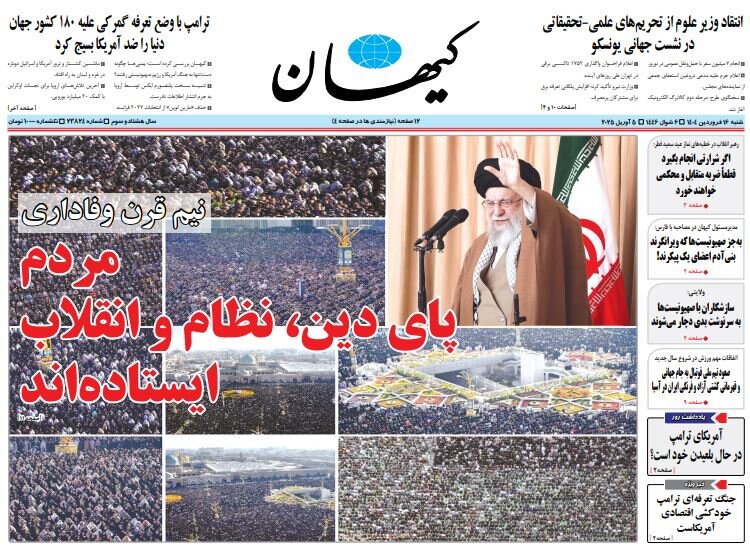Threats and smiles are America’s old policy!

TEHRAN - In an article, Kayhan addressed the contradiction in Washington’s policy and wrote: The United States of America has once again turned to its repetitive and deceptive game.
On one hand, it uses the language of threats and sanctions against the Islamic Republic of Iran, and on the other, it talks about negotiations and interaction. This conflicting policy vision, which has been on the agenda of White House leaders for years, has been pursued with greater intensity by Trump in recent times. One day, Trump speaks of “decisive confrontation and destruction” of Iran, and the next day of the possibility of negotiations without preconditions! This is the same old “carrot and stick” policy that Americans have always adopted to deceive public opinion and win one-sided concessions. Trump and his warmongering team, which consists of Zionists and neoconservatives, know very well that the Islamic Republic of Iran is an independent and powerful country that will neither retreat with threats nor be fooled by diplomatic smiles. One of the biggest lessons that Iran and other countries have learned from American policies is that Washington is the most unreliable country in international relations. The Iranian people have repeatedly shown that they are united and resilient against America’s hostile policies.
JAM-E-JAM: Tehran and Riyadh and many opportunities for cooperation
In a note, Jam-e-Jam addressed Iran's increasing relations with neighbors, especially Saudi Arabia. It wrote: Basically, the strategy of the Islamic Republic of Iran is to develop relations with neighbors in various political, security, economic, commercial, and cultural areas. During the last year (the Persian calendar year that fell between March 2024 and March 2025), Iran's relations with Saudi Arabia improved. Iran and Saudi Arabia cooperated closely on the issue of supporting Palestine and the oppressed people of Gaza and condemning the Israeli occupation of Arab lands. We think of a broad and deep cooperation, and Iran and Saudi Arabia can contribute to peace and stability in the region by working together. We continue to pin our hopes on this cooperation in bilateral and multilateral sectors for economic development and stability of the region. We are confident that the regional countries can determine their destiny by emphasizing endogenous security and cooperation among themselves without being influenced by external variables or foreign interference.
Hamshahri: New customers for Iranian weapons
In a commentary, Hamshahri highlighted Iran’s participation in the 2025 Latin America Aerospace and Defense (LAAD) international exhibition in Rio de Janeiro, Brazil. It wrote: Iran’s participation in Brazil’s aerospace and defense exhibition has provided the opportunity for the Islamic Republic to display its defense equipment in Latin America. The Iranian pavilion successfully drew the attention of many visitors. According to the "Asia Live" website, Brazilians' interest in Iranian weapons is, above all, an indication of Brazil's growing desire for strategic autonomy. As non-Western weapons manufacturers, including Iran, gain a position in Latin America, the United States' position as a traditional supplier of weapons in the region is weakening. Brazil's purchase of Iranian drones could become a diplomatic challenge for Washington, as the United States has long viewed Latin America as its "strategic backyard," bolstering its influence through military aid, defense sales, and security partnerships.
Shargh: Why are Arab countries distancing themselves from Iran-US conflict?
Shargh examined the reason why Arab countries in the Persian Gulf region are opposed to the United States’ military threats against Iran. The paper said: In recent years, the approach of the Arab countries of the Persian Gulf towards regional crises, especially the tension between the Islamic Republic of Iran and the United States, has been accompanied by a kind of strategic caution and political consideration. First of all, economic interdependence in the region is a key factor in the formulation of such cautious policy. In terms of geopolitics, Arab countries, realizing the changing balance of power in the region, are trying to play an active role in regional security. It is part of the effort to de-escalate tensions, engage in dialogue with Tehran, and initiate regional diplomacy that seeks to reduce security dependence on trans-regional powers and increase independent role-playing in the future regional system. In general, the regional Arab countries have correctly understood that the costs of entering into a conflict between Iran and the United States are beyond their national and regional tolerance. Strategic rationality necessitates playing the role of mediator on the path to stability rather than creating tension.
Leave a Comment